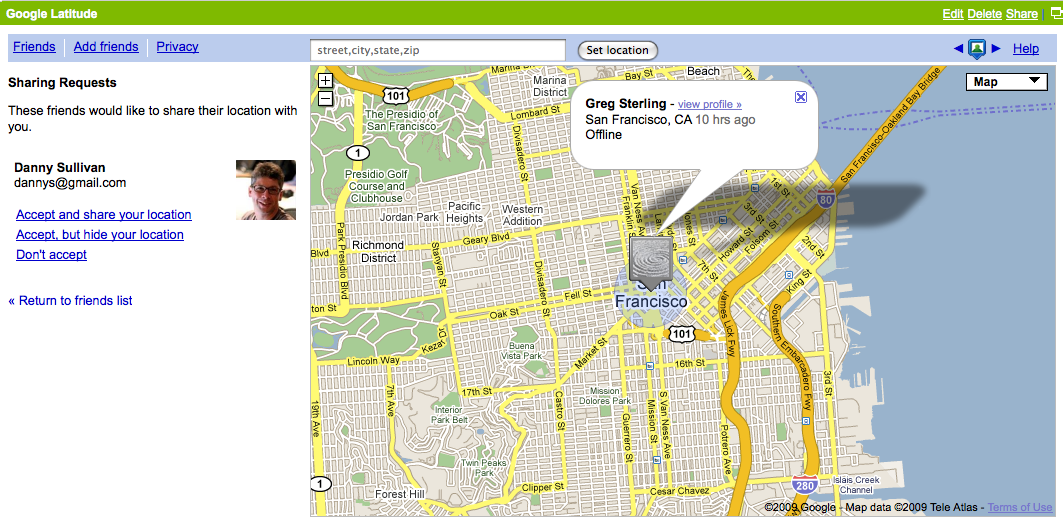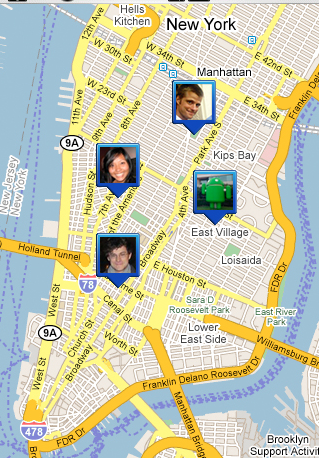Google Latitude Turns Maps (For Mobile) Into Social Tool
Google Latitude is now live, a new service from Google that allows you to send your location to Google Maps and share it with friends via many mobile phones (not the iPhone yet, but that’s coming). Some might call the just-launched Google Latitude (part of a new version of Google Maps for Mobile) “son of […]
Google Latitude is now live, a new service from Google that allows you to send your location to Google Maps and share it with friends via many mobile phones (not the iPhone yet, but that’s coming).
Some might call the just-launched Google Latitude (part of a new version of Google Maps for Mobile) “son of Dodgeball,” although it’s more elegant and user friendly.
Google bought early mobile social networking service Dodgeball in 2005 and shuttered it in 2008. It also acquired the “Twitter-like” Jaiku in October of 2007. Google never really developed the Jaiku service and effectively jettisoned it at the same time Dodgeball’s closure was announced, deciding to make the code open source for others to use and develop late last year.
The conventional wisdom (including mine) was that Google squandered an opportunity with these services — and especially — Dodgeball, which was well ahead of the mobile social networking curve that is now on the rise. But now we have Latitude that seems to provide both services in one.
Steve Lee, Google’s product manager in charge of Latitude, told me that Latitude is not built on any of these prior acquisitions or technologies. But it is a conceptual successor to those services. It also follows other, similar services from Loopt, Pelago/Whrrl and uLocate’s Buddy Beacon. There are some similarities to Yahoo Fire Eagle as well.
It used to be the case that when Google launched a service that matched or was similar to other existing tools or services in the market it was dubbed the “____ killer.” The notion being that the Google product would win and overtake existing services. That has proven to be true in some cases but more often incorrect. In this particular case it may turn out to be more true than not.
Part of Google Maps
Google Maps for Mobile is hugely popular and has a very large installed user base. Latitude is not a separate service that people need to separately adopt and configure but an extension of existing Maps for Mobile functionality. People simply need to download the latest version of Maps for their phone and opt-in to location sharing.
Latitude’s location-awareness capabilities are built on Google’s Wifi and cell tower triangulation that form the basis for its My Location tool.
All of the competitive services, which vary in their similarity and overlap with what Google is doing, are still largely unknown — even Loopt, which has been the highest profile among the mobile consumer sites offering real-time location awareness and “mobile social networking.”
This doesn’t necessarily mean those services are now going to atrophy or fail. Indeed one or two of them could gain because of the awareness that Google brings to the segment. But it also means that if Latitude takes off in a big way, they’ll have to work much harder to attract users.
Another advantage that Latitude brings is that it also launches at scale: 27 countries and across BlackBerry, Symbian, Windows Mobile and Android. An iPhone version is coming soon.
In the US (only right now), there’s also an iGoogle Gadget that links the desktop to Google Maps for Mobile. People who’ve opted in can expose their location and/or see their friends on a Map widget for iGoogle:
The iGoogle Gadget requires the installation of Gears on the desktop.
See Where Your Friends Are in Real Time
The “pitch” for Latitude is “see where your friends are in real time.” This is pretty simple and direct and lots of people, I’m guessing, will immediately respond to it. Right now there are two ways to add people to your network: email and GMail contacts. Because of the latter — again showing the advantages of an installed base of users — I don’t have to do very much except notify my list of contacts that I want to share my location with them. There’s no cumbersome registration process, etc.
Privacy
Lots of people and many reporters go right to the “big brother” privacy issue with a service like this — and conceptually it’s not unjustified.
But Google has built lots of privacy controls to Latitude. First, the system is entirely opt-in. So people who use Google Maps on their smartphones can choose not to do it at all. End of story. Those who do opt in can do so very selectively with individual people; one can hide at any time from selected contacts or the entire network. One can also expose location at the city level or extremely precisely (using triangulation/GPS). Users can also sign out when they simply don’t want to be located.
Location can also be set manually. I can thus appear to be in Paris, France when I’m really in Southern California. Steve Lee told me this was one of the surprises from the testing Google did with early users. Many people placed themselves “aspirationally” in different locations (e.g., I’d rather be in Hawaii) than where they actually were. This manual location setting is also a strong feature of Yahoo Fire Eagle.
The “big brother” talk is thus overblown; users have total control over the system and location sharing.
Integration with Google Talk
One very nice feature that exists to different degrees on different mobile platforms is integration with Google Talk. In the case of Android or the coming iPhone version, users will be able to chat with their Latitude network. This is a significant feature and will add to the popularity of the service. In cases, such as BlackBerry, where Google Talk is available but not integrated with Maps/Latitude one can still do this but it’s not quite as “seamless.”
Directions to Me or You
Latitude allows users to get directions to one another but not to an identified business or other location (right now). You can of course use Google Maps to get directions to any location already. However I discussed a novel scenario with Google’s Lee where I place myself at the destination bar, restaurant or hotel and my network can get directions to that location if we’re all converging there — though I may not yet be there.
We can expect lots of changes and upgrades to the functionality around directions and locations in coming versions of the service.
Monetization
And now for the inevitable question: what are Google’s intentions around monetization? Google mobile search and Maps already feature advertising/location-based ads. There’s no plan to insert new or additional advertising (location specific or otherwise) into the Latitude functionality. In general, however, advertising on Maps for Mobile will likely evolve.
On the PC, people who install Gears and participate in location sharing offer Google another tool to determine location more accurately and factor that into ad serving.
What about Facebook?
Traditional social networks such as MySpace and Facebook are making a big push into mobile right now. In fact Facebook recently said that it has 25 million mobile users on a monthly basis and four million actively daily users in mobile. For several reasons, Latitude would not be easy for Facebook to duplicate elegantly at the moment but similar functionality has probably been discussed or is on some white board in some room in Palo Alto, where Facebook is based.
A similar offering would represent a natural evolution of Facebook’s mobile application. However we’ll see if the social network develops something like this.
Outlook for Latitude
I’m going to predict that Latitude will be enormously successful. And beyond being a fun and useful addition to Google Maps, it represents another bite at the social networking apple — so to speak — for Google.
[youtube]https://www.youtube.com/watch?v=Q-Oq-9enE-k[/youtube]
For more, see related discussion on Techmeme.
Opinions expressed in this article are those of the guest author and not necessarily Search Engine Land. Staff authors are listed here.
Related stories
New on Search Engine Land


